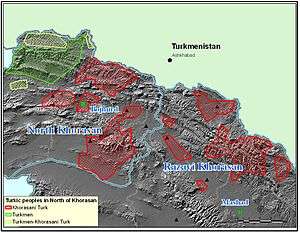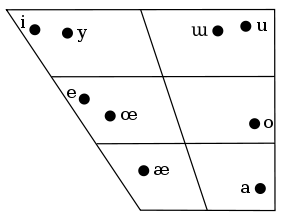Khorasani Turkic language
| Khorasani Turkic Xorasan Türkcǝsi | |
|---|---|
| Native to | Iran |
| Region | north Khorasan Province, Razavi Khorasan Province |
Native speakers | 1 million (1993)[1][2] |
| Language codes | |
| ISO 639-3 |
kmz |
| Glottolog |
khor1269[3] |
Khorasani Turkic (Xorasan Türkçesi, Persian: ترکی خراسانی, Torki-e Khorasani), or Qizilbash Turkic, is a language variety in the Turkic language family. It is spoken in northern North Khorasan Province and Razavi Khorasan Province in Iran. Nearly all Khorasani Turkic speakers are also bilingual in Persian.[4]
Geographic distribution

Khorasani Turkic is spoken in the Iranian provinces of North Khorasan, near Bojnourd, and Razavi Khorasan, near Sabzevar, Quchan. If the Oghuz dialect of Uzbek is considered a dialect of Khorasani Turkic, its range extends into western Uzbekistan.
Dialects
Khorasani Turkic is split into North, South, and West dialects. The northern dialect is spoken in North Khorasan near Quchan; the southern in Soltanabad near Sabzevar; the western around Bojnourd.
Classification and related languages
Khorasani Turkic belongs to the Oghuz group of Turkic languages, which also includes Turkish, Azerbaijani, Gagauz, Balkan Gagauz Turkish, Turkmen, and Salar, as well as the Oghuz dialect spoken in Uzbekistan. Khorasani Turkish is most closely related to Oghuz Uzbek and Turkmen and is close to the Azerbaijani dialects spoken in Iran. It is linguistically between Azerbaijani and Turkmen, but it is not a dialect of either.[5]
Sounds
Consonants
| Labial | Alveolar | Palatal | Velar | Uvular | Glottal | |||||||
|---|---|---|---|---|---|---|---|---|---|---|---|---|
| Plosive | p | b | t | d | k | ɡ | q | |||||
| Affricate | t͡ʃ | d͡ʒ | ||||||||||
| Fricative | f | v | s | z | ʃ | x | ɣ | h | ||||
| Nasal | m | n | ɲ | ŋ | ||||||||
| Flap | ɲ | |||||||||||
| Lateral | l | |||||||||||
| Approximant | j | |||||||||||
Vowels

Morphology
Nouns
Pluralization
Pluralization is marked on nouns with the suffix -lAr, which has the two forms -lar and -lær, depending on vowel harmony.
Case
Nouns in Khorasani Turkish take a number of case endings that change based on vowel harmony and whether they follow a vowel or a consonant:
| Case | After Vowels | After Consonants |
|---|---|---|
| Nominative | No Ending | |
| Genitive | niŋ/nin | iŋ/in |
| Dative | ya/yæ | a/æ |
| Accusative | ni/nɯ | i/ɯ |
| Locative | da/dæ | |
| Ablative | dan/dæn | |
| Instrumental | nan/næn | |
Possession
Possession is marked with a suffix on the possessed noun.
| Singular | Plural | |
|---|---|---|
| First Person | (I)m | (I)mIz |
| Second Person | (I)ŋ | (I)ŋIz |
| Third Person | (s)I | lArI |
Pronouns
Khorasani Turkish has six personal pronouns. Occasionally, personal pronouns take different case endings from regular nouns.
| Singular | Plural | |
|---|---|---|
| First Person | mæn | bɯz |
| Second Person | sæn | siz |
| Third Person | o | olar |
Verbs
Verbs are declined for tense, aspect, mood, person, and number. The infinitive form of the verb ends in -max.
Examples
- Excerpt from Tulu (1989) p. 90
| Translation | IPA | |
|---|---|---|
| Thus, there was a padishah named Ziyad. | ɑl ɣəssa bir ziyæːd pæːdiʃæːhiː bæːɾɨdɨ | |
| Almighty God had given him no son. | xodɒːʷændi æːlæm ona hit͡ʃ ɔɣul ataː elæmɑmiʃdi | |
| There he spoke to his vizier: "O Vizier, I have no son. What shall I do about it?" | bæːdæn vaziːɾæ dədi, ej vaziːɾ, mændæ ki ɔɣul joxdɨ, mæn næ t͡ʃaːɾæ eylem | |
| The vizier said: "Ruler of the whole world, what will you do with this possession?" | vaziːɾ dədi, pɒːdiʃaː-i ɢɨblæ-ji ɒːlæm, sæn bu mɒːlɨ-æmwɒːlɨ næjlijæsæn |
References
- ↑ Doerfer, G. & Hesche, W.1993. Chorasantürkisch, Wörterlisten, Kurzgrammatiken, İndices. (Turcologica 16.) Wiesbaden: Harrassowitz, pp. 7,14
- ↑ Encyclopædia Iranica :TURKIC LANGUAGES OF PERSIA: AN OVERVIEW
- ↑ Nordhoff, Sebastian; Hammarström, Harald; Forkel, Robert; Haspelmath, Martin, eds. (2013). "Khorasani Turkish". Glottolog. Leipzig: Max Planck Institute for Evolutionary Anthropology.
- ↑ "Ethnologue report for Khorasani Turkish"
- ↑ Ethnologue
Tulu, Sultan (1989). Chorasantürkische Materialien aus Kalāt bei Esfarāyen. Berlin: Klaus Schwarz Verlag. ISBN 3-922968-88-0.
Doerfer, Gerhard; Hesche, Wolfram (1993). Chorasantürkisch: Wörterlisten, Kurzgrammatiken, Indices. Wiesbaden: Harrassowitz. ISBN 3-447-03320-7.
External links
| Khorasani Turkic language test of Wikipedia at Wikimedia Incubator |
| ||||||||||||||||||||||||||||||||||||||||||||||||